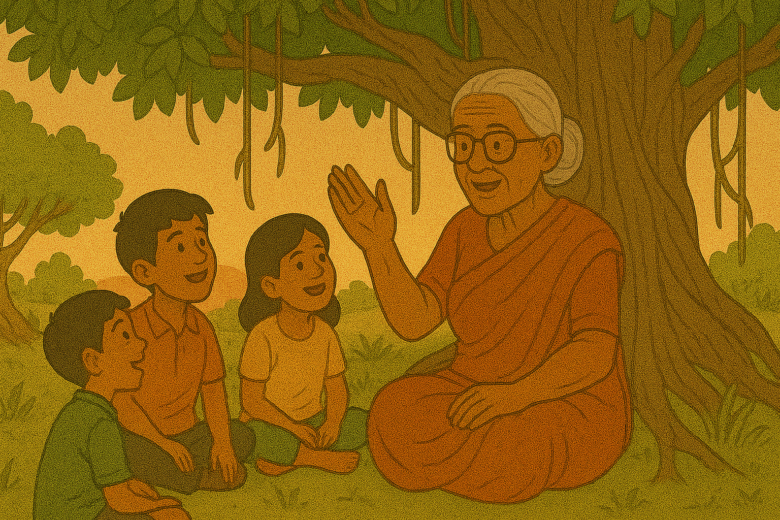Fun fact: Before written history became common in India, most knowledge, from kings and wars to recipes and taboos, was passed down through stories told by grandmothers.
If you’ve ever sat on a charpai (woven cot) under a fan during a power cut, with your dadi (paternal grandmother) or nani (maternal grandmother) narrating a tale about “those days,” congratulations—you’ve been part of India’s most enduring historical archive: oral storytelling.
In a world racing toward artificial intelligence (AI), machine learning, and data science, there’s a quiet, timeless power in our grandmothers’ words. They are the historians we never formally acknowledged—yet their voices carry generations of memory, wisdom, and resilience.
In this article, we explore why India’s grandmothers are more than family elders—they are living archives, and their oral histories offer a deeper, more intimate view of our past than most textbooks ever could.
The Legacy of Oral History in India
India’s history has always been richly oral. The Vedas—among the oldest texts in the world—were memorised and recited for centuries before they were ever written. Epics like the Ramayana and Mahabharata spread through generations as sung verses and dramatic retellings.
In rural India, where literacy was historically low, oral history wasn’t just tradition—it was survival. Grandmothers, who often remained in their homes while men migrated for work, preserved and passed on stories of famine, festivals, partition, caste, kinship, customs, and community life.
They were, quite literally, walking encyclopaedias.
What Makes a Grandmother a Historian?
Unlike academic historians who rely on written records, citations, and dates, grandmothers remember history through people, emotions, rituals, and food. Their archive is not located in libraries but in kitchens, verandas, and late-night conversations.
And while professional historians often study what happened, grandmothers recall how it felt.
Take, for instance, the story of Partition (1947). Many Indian families were torn apart in the chaos, but your grandmother’s version likely doesn’t begin with political borders. It might begin with how her cousin never returned from Lahore. Or how her family hid in a well. Or how she wore three sets of clothes while fleeing.
These details are missing from textbooks—but they’re felt, not forgotten.
Oral Stories and Hidden Histories
India’s grandmothers often tell stories that challenge dominant historical narratives.
Women’s Roles in Movements:
Freedom fighters like Rani Lakshmibai are remembered, but what about the women who hid salt during the Salt March or smuggled food for rebels? Many of these stories exist only in family memories.
Caste and Class Stories:
Stories of untouchability, land struggles, or inter-caste love affairs often remained undocumented in mainstream history. Yet grandmothers recall them with a clarity no academic ever captured.
Folk Traditions:
Every region—whether it’s Rajasthan’s Pabuji ki Phad or Bengal’s Baul songs—has women who remember forgotten gods, oral genealogies, or rituals never written down.

Grandmother as Archive: A Case from Kerala
In Kozhikode, Kerala, 78-year-old Pathumma Beevi has memorised over 500 Mappila paattu—Muslim folk songs that mix Malayalam, Arabic, and Tamil. These songs describe seafaring, love, trade with Arabia, and resistance against the British.
With no formal education, Beevi has become a local legend. She performs these songs at community events, and a few years ago, a university finally recorded and archived her performances.
She never called herself a historian. But ask her about the Portuguese invasion or the spices that once ruled the sea, and she’ll give you stories richer than any museum.
Why Oral History Still Matters Today
It Humanises the Past: Oral stories bring warmth to cold facts. They help us understand people, not just policies.
It Fills the Gaps: India’s official history often sidelines regional and marginalised voices. Oral histories ensure they aren’t erased.
It Passes Down Identity: Language, rituals, taboos, lullabies—these are histories too. And they often live only in the minds of our grandmothers.
It’s in Danger: As nuclear families rise, and urbanisation breaks the tradition of multigenerational living, we’re losing our oral historians faster than we realise.
“Khaane ke saath kahani”: Food as History
Ever noticed how your grandmother’s recipes come with stories?
“The way we make achar changed after the drought,” she says, or “we started using more millet during the rationing years.”
Each dish has a footnote. Each ingredient has a backstory.
Historians of food now treat these recollections as legitimate culinary histories, especially in documenting regional diets and food insecurity.
In Delhi, the project “Memory Recipes” has recorded over 300 stories from Indian grandmothers, linking family recipes to events like war, migration, or seasonal scarcity.
Why Modern India Should Listen More Closely
As India grows younger—over 65% of its population is under 35—we risk losing the old. Not just in people, but in memory.
We chase digital archives, but ignore the analogue voices in our homes.
Projects like the Oral History Association of India (OHAI) and The People’s Archive of Rural India (PARI) have begun documenting such voices, but they barely scratch the surface.
Our grandmothers are not just caretakers of culture—they’re the last living link to India’s unwritten past.
Conclusion: Record Before It’s Too Late
Call your grandmother. Sit beside her. Ask her about the time she was your age. Ask her what people wore, what they ate, what scared them, and what made them laugh. Record it. Write it. Save it.
Because when she’s gone, so are centuries of memories.
Let us not wait for history to vanish in silence. Let’s honour our quiet historians while they’re still here—on the edge of memory, waiting to be heard.
Author’s Note
Oral storytelling has long played a vital role in preserving India’s diverse histories, especially those overlooked by written records. This article aims to highlight the often-unrecognised contributions of elderly women as custodians of cultural memory and to encourage greater appreciation for the stories they carry before they are lost to time.
G.C., Ecosociosphere contributor.





Comments
Good and a different initiative. Wish you the best.